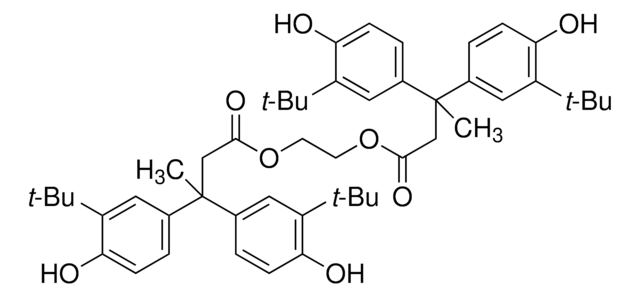O0140000
Plastic additive 20
European Pharmacopoeia (EP) Reference Standard
Synonyme(s) :
Oleamide, Oleamide R, cis-9,10-Octadecenoamide, cis-9-Octadecenamide, Oleic acid amide
About This Item
Produits recommandés
Qualité
pharmaceutical primary standard
Fabricant/nom de marque
EDQM
Contrôle du médicament
regulated under CDSA - not available from Sigma-Aldrich Canada
Application(s)
pharmaceutical (small molecule)
Format
neat
Température de stockage
2-8°C
Chaîne SMILES
CCCCCCCC\C=C/CCCCCCCC(N)=O
InChI
1S/C18H35NO/c1-2-3-4-5-6-7-8-9-10-11-12-13-14-15-16-17-18(19)20/h9-10H,2-8,11-17H2,1H3,(H2,19,20)/b10-9-
Clé InChI
FATBGEAMYMYZAF-KTKRTIGZSA-N
Vous recherchez des produits similaires ? Visite Guide de comparaison des produits
Description générale
Application
Actions biochimiques/physiologiques
Conditionnement
Autres remarques
Mentions de danger
Conseils de prudence
Classification des risques
Aquatic Chronic 4
Code de la classe de stockage
11 - Combustible Solids
Classe de danger pour l'eau (WGK)
WGK 1
Point d'éclair (°F)
404.6 °F - closed cup
Point d'éclair (°C)
207 °C - closed cup
Faites votre choix parmi les versions les plus récentes :
Certificats d'analyse (COA)
Désolés, nous n'avons pas de COA pour ce produit disponible en ligne pour le moment.
Si vous avez besoin d'assistance, veuillez contacter Service Clients
Déjà en possession de ce produit ?
Retrouvez la documentation relative aux produits que vous avez récemment achetés dans la Bibliothèque de documents.
Les clients ont également consulté
Notre équipe de scientifiques dispose d'une expérience dans tous les secteurs de la recherche, notamment en sciences de la vie, science des matériaux, synthèse chimique, chromatographie, analyse et dans de nombreux autres domaines..
Contacter notre Service technique







